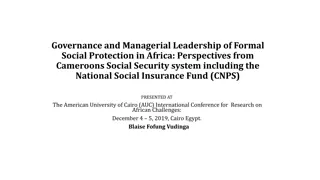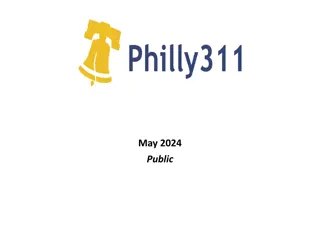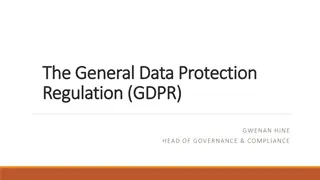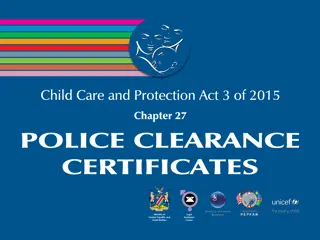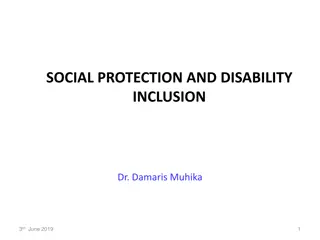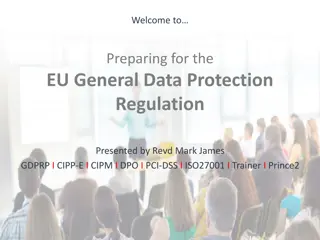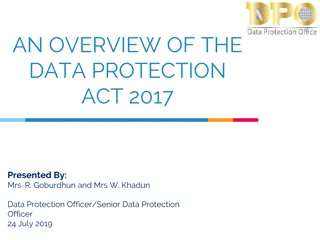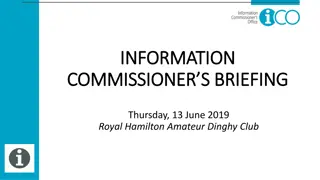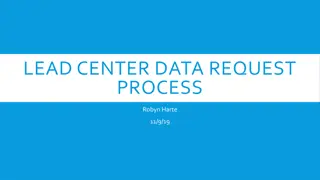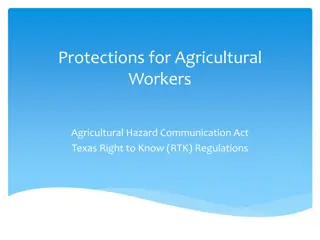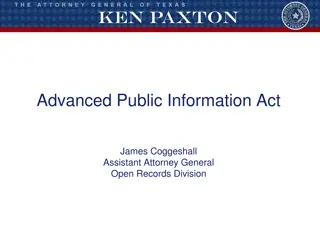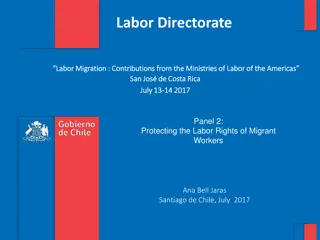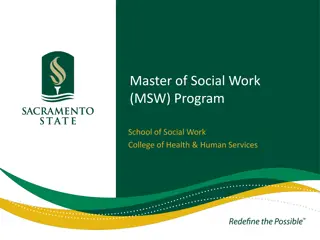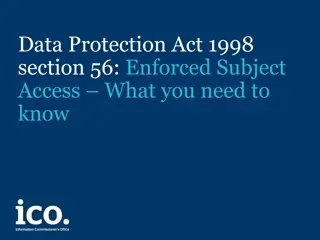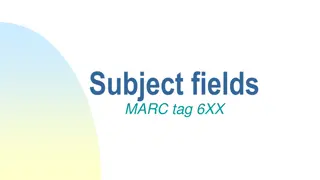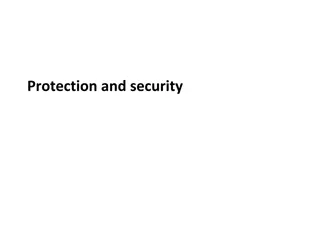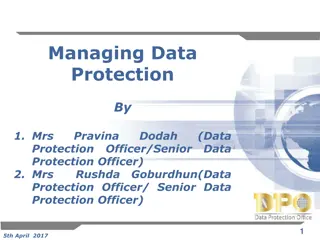Guidance on Subject Access Requests under Data Protection Act 2018 for Social Workers in Children's Services
This guidance provides information on Subject Access Requests (SARs) under the Data Protection Act 2018, specifically tailored for social workers in children's services. It explains what SARs are, how requests can be made, considerations for handling requests related to children and young people, and where personal information is typically held. The guidance emphasizes the importance of respecting individuals' rights to access their personal information while ensuring appropriate safeguards are in place, particularly when dealing with sensitive data.
Download Presentation

Please find below an Image/Link to download the presentation.
The content on the website is provided AS IS for your information and personal use only. It may not be sold, licensed, or shared on other websites without obtaining consent from the author. Download presentation by click this link. If you encounter any issues during the download, it is possible that the publisher has removed the file from their server.
E N D
Presentation Transcript
SUBJECT ACCESS REQUESTS (DATA PROTECTION ACT 2018) Guidance for Social Workers in Children s Services
Introduction The Department s current procedure is that when a case is active the allocated social worker is responsible for processing the Subject Access Request (SAR). The Department s Access To Records policy and procedure is available to view online at: http://wirralchildcare.proceduresonline.com The purpose of this guidance is to supplement the Department s existing procedure.
What is a SAR? A SAR is a request made by or on behalf of an individual for sight of the information that they are entitled to under Article 15 of the General Data Protection Regulations. Essentially, this is a request for sight of the individual s personal information held by children s social care.
How can a request be made? A request can be made to the Department in almost any format. This covers verbal requests and even those received via social media! All requests, regardless of how they have been received, must be acted on.
Requests for information about children and young people Even if a child is too young to understand what the request is, or if the requester holds Parental Responsibility for the child, the personal information belongs to the child. Where it is not felt to be in the best interest of the child to release their personal information to a third party, a Best Interest decision can be made not to release.
A child aged 12+ and considered competent can provide consent for a third party to access their personal information. Good practice would be to check the child is aware of all of the information that is being released to the third party. The more sensitive the information, the more robust the social worker s checks need to be that the child understands what is being released.
Where is the personal information held? Liquid Logic is the database used to store information about management and so should be the main source of personal data. individual case The Data Protection Act 2018 covers emails. The right of access only applies to the individual s personal contained within an email. information
Is social work data ever exempt from SARs? The usual exemptions, such as third party data, applies to social work data. For instance, if the social work data contains the personal information of another family member this is likely to require redaction. Right of access to social work data is also exempted if the information is processed by or presented to the court. Social work data is also exempted if the request is from a person Responsibility for a child aged under 18 who does not consent to it being shared. who holds Parental Social work data is also exempted if disclosure could put any individual at risk or prejudice the carrying out of social work.
Social work data consisting of information as to whether the data subject is or has been the subject of, or may be at risk of, child abuse can also be exempted if the request is not considered to be in the child s best interest. An example could be from a parent who has been subject to an allegation of child abuse by the child. More information about the social work data exemptions can be found at the following link: https://ico.org.uk/for-organisations/guide-to- data-protection/guide-to-the-general-data- protection-regulation-gdpr/exemptions/#ex25 If any decisions are made not to disclose a clear rationale why should be recorded on the child s Liquid Logic file.
How to supply the information Try to establish if there is a specific document or time period that the requester is seeking- this could hugely reduce the scope of the request and therefore the work required to complete it. It s usually easier to condense the personal data rather than supplying documents that are largely redacted. Ways to consider could be to cut and paste relevant aspects of personal information onto a word document, or providing a summary of what is recorded. Keep a copy of the original documents and the final SAR and provide copies of both to Cath Davies, Data Protection recording. This was an outcome of the most recent Information Commissioner s Office council audit. Co-ordinator for
The ICO is the UKs independent authority set up to uphold information rights in the public interest, promoting openness by public bodies and data privacy for individuals. These principles should be applied whenever a document is being shared with families. For example, does the Single Assessment contain the personal information of a separated parent who has not provided their consent for the other parent to see it? When in doubt, the council s Data Protection Officer is Jane Corrin who should be available for advice. Jane can be DPO@wirral.gov.uk contacted via email




